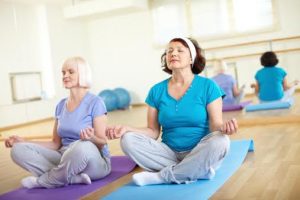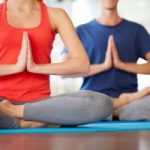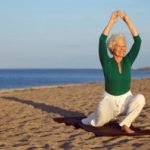

 September is National Yoga Awareness Month, so we present some of our stories discussing the benefits of yoga, including its effects on PTSD, depression, urinary incontinence, prostate cancer, COPD, and arthritis.
September is National Yoga Awareness Month, so we present some of our stories discussing the benefits of yoga, including its effects on PTSD, depression, urinary incontinence, prostate cancer, COPD, and arthritis.
Yoga has vastly grown in popularity recently, and with so many different varieties existing, just about anyone of any fitness level can get involved. Yoga is an ancient practice that involves a variety of poses, breathing techniques, and meditation. Although it may look complicated, attentive guidance by a trained instructor can greatly help you improve your practice.
The articles below discuss the many health benefits yoga can offer. We hope our discussion will spark your interest and encourage you to try this ancient practice as a means of improving your health.
Yoga may help combat depression, post-traumatic stress disorder (PTSD), and anxiety in seniors. Yoga continues to grow in popularity and for good reason, too. Yoga has been found to provide multiple benefits such as improving flexibility and strength along with reducing stress and anxiety.
For the study, researchers analyzed 13 literature reviews accounting for 185 articles. The researchers found that yoga has the potential to offer benefits to those suffering from PTSD, anxiety, and depression.
Coauthor Leslie Roach said, “Even though I do think yoga is, in general, incredibly beneficial, I also think there needs to be a whole lot more education about how to use yoga specifically to treat survivors of trauma in order to be the most effective and helpful. So as a standalone treatment right now, it’s just not viable. However, I think with more education, more research, and more experienced instructors, it will be.” Continue reading…
 Urinary incontinence in women can be treated with new recommendations, specialized yoga programs
Urinary incontinence in women can be treated with new recommendations, specialized yoga programsUrinary incontinence (UI) in women can be treated with new recommendations and specialized yoga programs. The findings come from UC San Francisco where researchers found that a specialized yoga program could help improve women’s urinary incontinence. The specialized yoga program is aimed at improving pelvic health, which can provide women with better control over their urination and help avoid accidental urination.
First author Alison Huang said, “Yoga is often directed at mindful awareness, increasing relaxation, and relieving anxiety and stress. For these reasons, yoga has been directed at a variety of other conditions – metabolic syndrome or pain syndromes – but there’s also a reason to think that it could help for incontinence as well.” Continue reading…
 Yoga benefits men undergoing prostate cancer treatment
Yoga benefits men undergoing prostate cancer treatmentYoga has been found to help diminish side effects associated with prostate cancer treatment. The findings come from researchers led by Neha Vapiwala, M.D., at the Perelman School of Medicine at the University of Pennsylvania.
Side effects experienced due to prostate cancer treatment are fatigue, changes in sexual health, and urinary incontinence. These side effects steadily diminished in the men who engaged in yoga over the course of the study. Dr. Vapiwala said, “Data have consistently shown declines in these important measures among prostate cancer patients undergoing cancer therapy without any structured fitness interventions, so the stable scores seen with our yoga program are really good news.” Continue reading…
 Yoga found effective for patients with COPD
Yoga found effective for patients with COPDPatients with chronic obstructive pulmonary disease (COPD) can now say “Namaste” after researchers found yoga to be an effective form of pulmonary rehabilitation.
The researchers at the Department of Pulmonary Medicine and Sleep Disorders and All India Institute of Medical Sciences found yoga exercises were just as effective as traditional pulmonary rehabilitation at improving pulmonary function, exercise capacity, and systemic inflammation in COPD patients.
Sixty COPD patients were divided into two groups – one group was shown yoga exercises and the other received traditional pulmonary rehabilitation. Patients were tested on breathing and shortness of breath, serum inflammation, and lung function. Training was completed for one hour, twice a week for four weeks, and then went down to only every two weeks for eight weeks. Then the participants trained at home for the rest of the study. Continue reading…
 Yoga eases arthritis symptoms, improves energy and mood
Yoga eases arthritis symptoms, improves energy and moodYoga is an ancient practice involving a combination of physically challenging postures, meant to improve both energy and mood, and is now becoming an activity of choice for many people dealing with the symptoms of arthritis.
Historical research suggests that Yoga was first developed in India over 5,000 years ago. Since then, various styles of yoga and different combinations of yoga poses have emerged. There is acro-yoga, which blends the wisdom of yoga and the power of acrobatics, hip-hop yoga that you do with fast-paced music, Doga, which essentially means you use your dog as a prop to deepen your poses, and naked yoga, which some may consider fun but somewhat racy. Continue reading…
Copyright © www.orthopaedics.win Bone Health All Rights Reserved